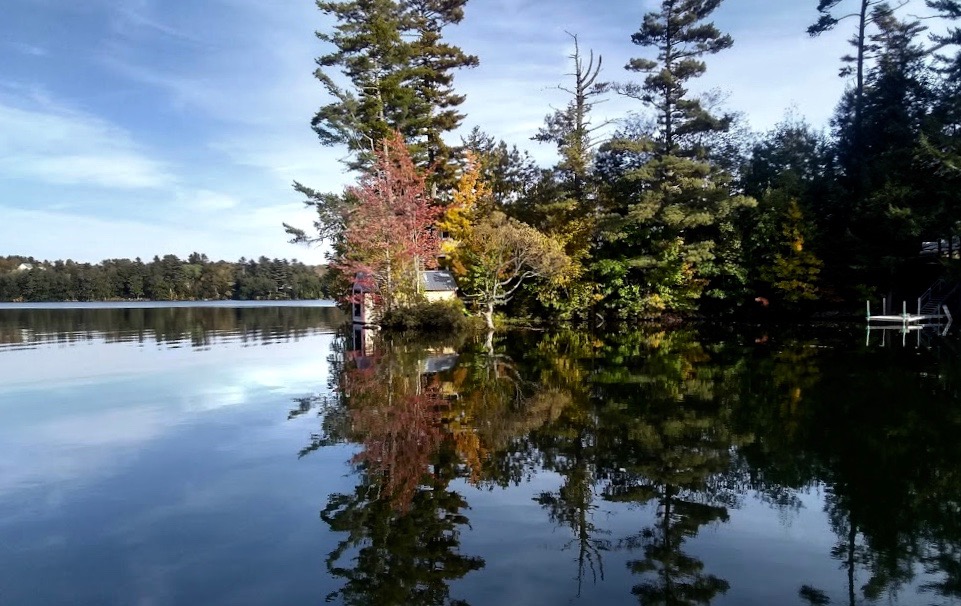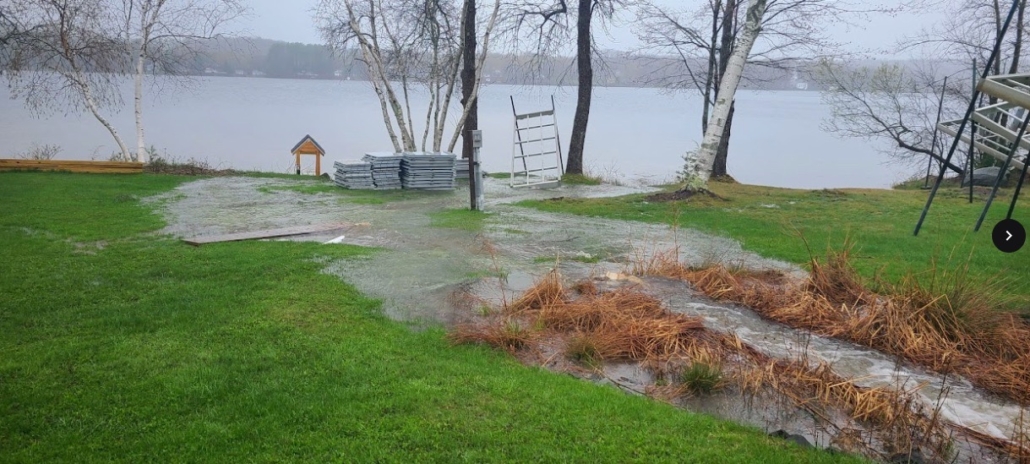LAKE LIFE TODAY: conclusion

China Lake
Lake Life Today is a series of articles that are hoped will inspire you to see how, by taking just a few steps, you can make a difference and help preserve the quality of water in our lakes for future generations.
These articles have been collected and organized by LakeSmart Director Elaine Philbrook, a member of China Region Lake Alliance (aka “the Alliance”) serving China Lake, Webber Pond, Three Mile Pond, and Three-Cornered Pond. The Alliance would like to thank our partners at Maine Lakes and Lakes Environmental Association (LEA) for information to support this article.
The LakeSmart Laker’s Dozen Lakes are fragile, Care for them today.
Enjoy them tomorrow.
As I listen to fewer loon calls at night and watch them gathering in social groups during the day, I am aware summer’s coming to a close. By the time you read this final Lake Life article of the season Meteorological Autumn will have begun. My hope has been that these Lake Life resources over the summer months would inspire you to take action and, knowing the difference you can make in the future, protect our lakes and ponds. One of my favorite quotes is, “Alone we can do so little; together we can do so much.” (Helen Keller) It seems very fitting about what needs to be done. Pick one or choose all 13 of the LakeSmart’s Dozen and make a difference for the future of our lakes and ponds.
1. Support Lake Associations.
Join the Board of Directors. Attend your Annual Lake Association’s meeting. Get involved. Visit lakes.me/map to see a map of Maine’s Member Lake Associations.
2. Stop The Spread of Invasives.
Clean plant fragments off your boat, trailer, and boating equipment before moving your boat.
Drain bilges away from the lake when you leave a waterbody.
Dry your boat or let it sit several days between uses on different water bodies.
Never transfer water or fish from lake to lake.
This is the law as of 2023:
https://www.maine.gov/ifw/docs/Clean%20Drain%20Dry%20Frequently%20Asked%20Questions.pdf
3. Follow Shoreland Zoning Rules.
What happens on land doesn’t stay on land. Actions you take on your property can have devastating consequences for the health of your lake. Before any project, check with your local Town Office or Code Enforcement Officer to see if you need a permit for work within the shoreland zone, the 250 feet deep strip of land along the edge of a lake.
4. End Erosion.
On a rainy day check around your buildings, paths, driveways, and roads to identify places where soil is eroding or washing away. Erosion drives phosphorus into the lake, which in turn feeds algae and causes lakes to turn green and “bloom.” Fix erosion by planting vegetation downslope; installing crushed stone or erosion control mulch where needed; or by constructing swales or rain gardens. For more information on these and other stormwater Best Management Practices visit lakes.me/BMPs.
5. Build Better Buffers.
Trees, shrubs, and grasses protect water quality by slowing down rainwater in order for phosphorus and other pollutants to filter out in the soil before washing into the lake. Deeper buffers are better, as are those with more layers of vegetation. Native plants do more for pollinators, birds, and other wildlife. Visit Maine Audubon Native Plant finder for resources on buffer plantings. https://mainenativeplants.org/
6. Ditch Fertilizers, Herbicides and Pesticides.
Long-lasting chemicals in these products can harm children, pets, and aquatic life. They can also feed algae in your lake and turn it green and smelly.
7. Take a Break. Stash Your Rake. Save the Lake!
Limit lawn size, mow less often, and leave clippings and you won’t need fertilizer. Try not to rake within 75’ of the shore. This comes highly recommended under Shoreland Zoning Guidelines and is also a practice that helps promote native pollinators, and shelters and feeds wildlife.
8. Don’t Stress Your Septic.
Check your septic system for signs of malfunction and pump the septic tank regularly. Have your service provider check the tank’s baffles. Use phosphorus-free cleaners and detergents. Stagger laundry loads and dishwasher runs to occur no more than once a day. Avoid using the (garbage) disposal, and minimize water use when possible. Don’t put toxics or grease down the drain. Visit lakes.me/septic for more info.
9. Build Lake-Friendly Docks.
Cedar, cypress, plastic, or aluminum are good dock materials.
10. Don’t Treat Your Lake Like a Washtub.
Dogs, humans, or boats should never be washed in the lake! Soap is not good for water quality. It feeds algae and isn’t good for fish or other wildlife.
11. Observe Headway Speed Close to Shore.
Maine law prohibits wakes from boats within 200 feet of shore. Boating wakes in shallow water disturbs aquatic habitat, stirs up sediment, destabilizes the shoreline, and can damage or destroy nearby loon nests.
12. Give Wildlife a Chance.
Lake shallows and land near the water provide food and shelter for more than 60 native wildlife species and can also serve as nurseries for their young. Don’t “Tidy them up!”
13. Learn About LakeSmart.
LakeSmart provides site-specific suggestions to homeowners on how to protect water quality, enhance property values, and prevent lake degradation. To learn more, visit lakesmart.org or contact Maine Lakes at lakesmart@lakes.me.
If you have any questions about what you can do to ensure the integrity of your valued lake or if you would like a free LakeSmart evaluation you can reach Elaine Philbrook by email at chinalakesmart@gmail.com and read past Lake Life articles in The Town Line newspaper.
“Live lightly on the land for the sake of the lake (LakeSmart).”
Responsible journalism is hard work!
It is also expensive!
If you enjoy reading The Town Line and the good news we bring you each week, would you consider a donation to help us continue the work we’re doing?
The Town Line is a 501(c)(3) nonprofit private foundation, and all donations are tax deductible under the Internal Revenue Service code.
To help, please visit our online donation page or mail a check payable to The Town Line, PO Box 89, South China, ME 04358. Your contribution is appreciated!





Leave a Reply
Want to join the discussion?Feel free to contribute!